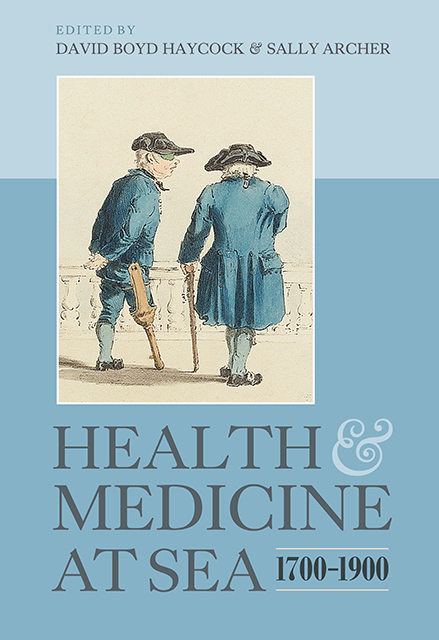Book contents
- Frontmatter
- Contents
- List of Figures and Tables
- Preface
- List of Contributors
- Acknowledgements
- List of Abbreviations
- Introduction Health, Medicine and the Maritime World: A History of Two Centuries
- 1 ‘The Intention is Certain Noble’: The Western Squadron, Medical Trials, and the Sick and Hurt Board during the Seven Years War (1756–63)
- 2 Royal Navy Surgeons, 1793–1815: A Collective Biography
- 3 Surgery in the Royal Navy during the Republican and Napoleonic Wars (1793–1815)
- 4 The Sick and Hurt Board: Fit for Purpose?
- 5 An ‘Important and Truly National Subject’: The West Africa Service and the Health of the Royal Navy in the Mid Nineteenth Century
- 6 Mortality and Migration: A Survey 128
- 7 Slave Purchasing Strategies and Shipboard Mortality: Day-to-Day Evidence from the Dutch African Trade, 1751–1797
- 8 Ships, Families and Surgeons: Migrant Voyages to Australia in the Age of Sail
- 9 Medical Encounters on the Kala Pani: Regulation and Resistance in the Passages of Indentured Indian Migrants, 1834–1900
- Bibliography
- Index
6 - Mortality and Migration: A Survey 128
Published online by Cambridge University Press: 07 March 2023
- Frontmatter
- Contents
- List of Figures and Tables
- Preface
- List of Contributors
- Acknowledgements
- List of Abbreviations
- Introduction Health, Medicine and the Maritime World: A History of Two Centuries
- 1 ‘The Intention is Certain Noble’: The Western Squadron, Medical Trials, and the Sick and Hurt Board during the Seven Years War (1756–63)
- 2 Royal Navy Surgeons, 1793–1815: A Collective Biography
- 3 Surgery in the Royal Navy during the Republican and Napoleonic Wars (1793–1815)
- 4 The Sick and Hurt Board: Fit for Purpose?
- 5 An ‘Important and Truly National Subject’: The West Africa Service and the Health of the Royal Navy in the Mid Nineteenth Century
- 6 Mortality and Migration: A Survey 128
- 7 Slave Purchasing Strategies and Shipboard Mortality: Day-to-Day Evidence from the Dutch African Trade, 1751–1797
- 8 Ships, Families and Surgeons: Migrant Voyages to Australia in the Age of Sail
- 9 Medical Encounters on the Kala Pani: Regulation and Resistance in the Passages of Indentured Indian Migrants, 1834–1900
- Bibliography
- Index
Summary
When the convict John Popjoy was disembarked from the transport vessel Larkins in 1817 he was found to be tattooed on his right arm with the verse ‘Rocks, hills and sands, and barren lands, kind fortune set me free, from roaring guns and women's tongues, O Lord deliver me’. There is much evidence to suggest that the emphasis of this talismanic tattoo was misplaced, for shipwrecks were comparatively rare events: of 337 convict voyages to the colony of Van Diemen's Land in the fifty years between 1803 and 1853, only two were wrecked. Nevertheless, in the age of sail, a trans-oceanic voyage was a dangerous undertaking – but the vast majority of deaths on the long run to Australia were caused by disease. During the past few decades, a number of scholars have attempted to quantify the mortality suffered by seaborne populations in the age of sail. Most of these studies have related to the bulk shipping of what can be termed ‘institutional’ populations in steerage. These include African slaves transported to the Americas (and the crews on board these slave vessels); British convicts transported to North America and Australia; various streams of Asian, Pacific Islander and African indentured labour shipped to various destinations around the world; and British emigrants whose passage was paid by the receiving colonies in Australia, New Zealand and South Africa.
It is well recognized in this literature that seaborne migrant populations were at risk of sickness and death during four distinct stages in the process of migration: on the route to the port of embarkation; at the port while awaiting departure; during the sea voyage; and after arrival at their destination. It is also recognized that diseases acquired in one stage could result in death in a subsequent stage. Furthermore, the accumulated insults of harsh treatment, poor and insanitary living arrangements and malnutrition experienced by some migrant groups would have had long-term consequences for their health. The privations suffered by slaves, for example, on the march to the coast and when confined in crowded and insanitary conditions at coastal forts, would have made them much more vulnerable to sickness and death both during the Middle Passage and after arrival in the Americas.
- Type
- Chapter
- Information
- Health and Medicine at Sea, 1700-1900 , pp. 128 - 142Publisher: Boydell & BrewerPrint publication year: 2009



